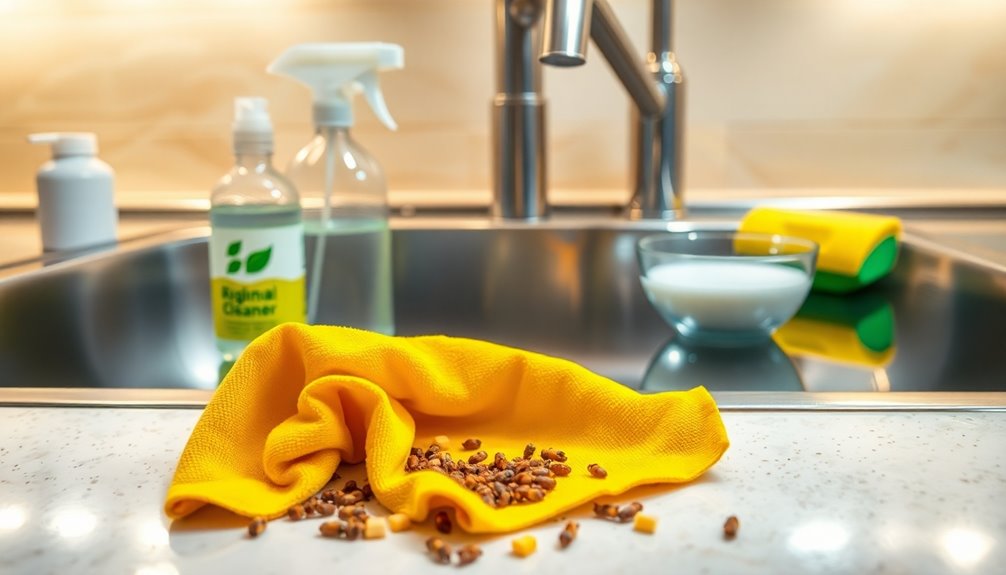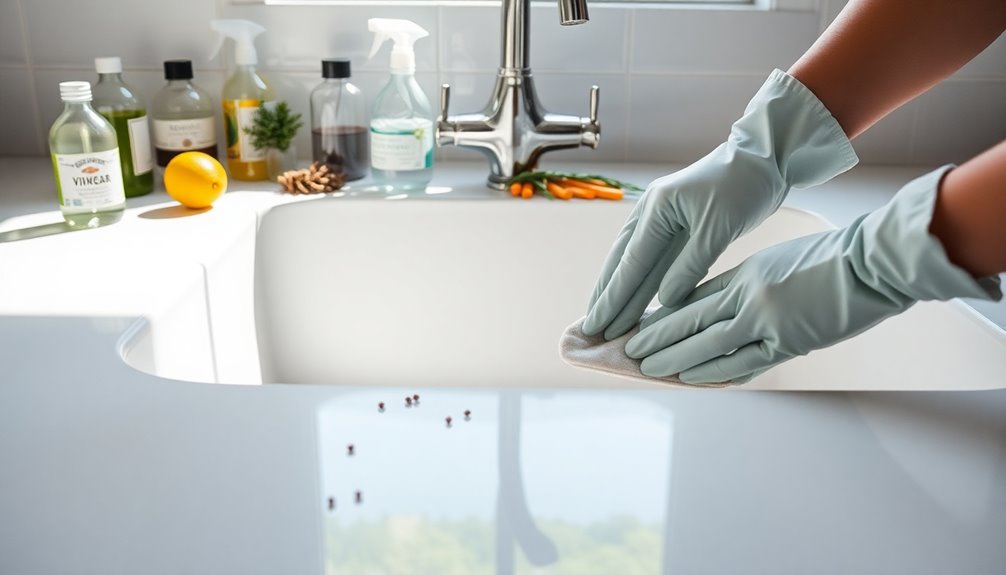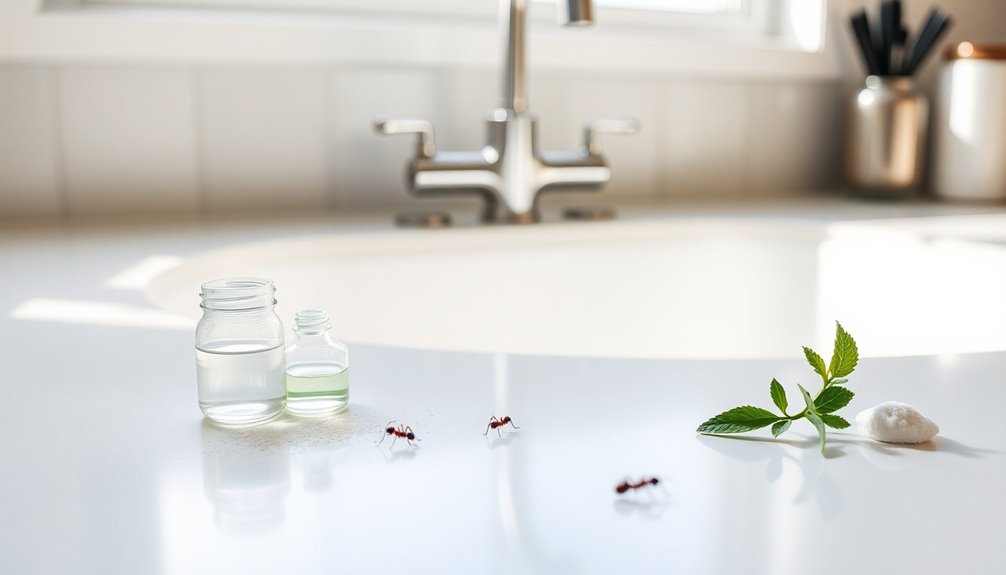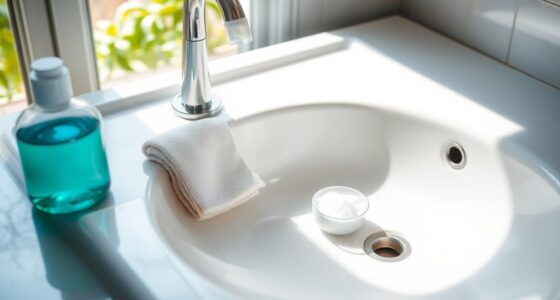To get rid of small ants around your kitchen sink, start by fixing moisture issues like leaky pipes and cleaning up spills. Scrub your sink and surrounding area to eliminate food remnants that attract ants. Use DIY control methods like vinegar solutions or homemade bait with boric acid and sugar. If ants persist, consider sealing entry points and using insecticides to tackle the problem effectively. Discover more strategies to keep your kitchen ant-free.
Key Takeaways
- Clean the kitchen sink and surrounding areas regularly to remove food remnants and moisture that attract ants.
- Seal gaps, cracks, and entry points around the sink with waterproof caulking to prevent ant access.
- Store food in airtight containers and promptly clean up spills to eliminate food sources for ants.
- Use DIY ant control solutions like boric acid and sugar bait to effectively lure and kill ants.
- Pour boiling water on ant trails or nests to destroy colonies and disrupt their movement.
Why Are Ants Around My Kitchen Sink?

Have you ever wondered why ants seem to flock to your kitchen sink? These tiny pests are often drawn to the moisture from leaky pipes or standing water, which they need to survive.
If you leave food remnants on dirty dishes or in drain pipes, you're likely attracting ants around your kitchen sink as they search for food and water sources. They also leave behind pheromone trails to guide their fellow ants to these resources, making it essential to disrupt these trails to prevent ants from returning.
Regularly cleaning your kitchen can help deter ant infestations, ensuring you maintain a clean kitchen. If you don't address this issue promptly, carpenter ants might even establish nests in waterlogged wood, leading to property damage.
How to Get Rid of Ants in Your Sink

To get rid of ants in your sink, start by removing any food sources that might attract them.
Clean up crumbs, rinse dirty dishes, and wipe down surfaces to eliminate odors.
Next, seal any cracks or gaps around the sink to keep ants from entering your kitchen.
Remove Food Sources
Keeping your kitchen sink clean is essential for preventing small ants from invading your home.
To effectively remove food sources that attract ants around your kitchen sink, follow these steps:
- Regularly scrub your sink and drain with vinegar or disinfectants to eliminate food remnants.
- Clean out catchers or traps that collect food particles and moisture.
- Sanitize your garbage disposals using ice cubes, bleach, or baking soda to remove any lingering food.
- Store all food in airtight containers to keep it out of reach.
Seal Entry Points
Since small ants can easily find their way into your home, sealing entry points around your kitchen sink is vital for preventing an infestation.
Start by inspecting gaps in caulking, cracks in walls, and openings around plumbing. These are common entry points for ants around your kitchen. Use waterproof caulking to seal any identified gaps effectively, which helps in keeping the ant problem at bay.
Don't forget to check window screens; verify they're intact and fit properly, as they can also let in small ants.
Regularly monitor for leaks or moisture issues under the sink, as these can attract ants and create new entry points. Keeping doors and windows closed or adding door sweeps can further assist in preventing ants.
Fix Your Moisture Problem

Moisture problems in your kitchen can attract small ants, so addressing them is vital for keeping these pests at bay.
Start by checking for leaky pipes under the sink, as these can create a water source for ants. Confirm the caulking around the sink edges is intact and replace any deteriorated sections to prevent moisture seepage.
Regularly inspect for standing water from damp sponges or spills, and promptly dry any moisture. Maintaining a dry environment is essential, so consider these tips:
- Fix any leaky pipes you find
- Replace worn or missing caulking
- Clean up spills immediately
- Keep the sink area dry and tidy
Clean Up Food Remnants

To keep small ants at bay, you need to clean surfaces regularly and maintain proper hygiene in your sink.
Make sure to store food properly and eliminate any potential food sources that might attract these pests.
A clean kitchen is your first line of defense against an ant invasion.
Regularly Clean Surfaces
Regularly cleaning surfaces is essential in keeping small ants at bay. If you want to prevent these pests, focus on eliminating food remnants that attract ants.
Here's how to effectively clean your kitchen:
- Regularly scrub the kitchen sink and surrounding areas with disinfecting solutions like vinegar or bleach.
- Clean food traps or catchers in the sink daily to remove any debris.
- Wipe down countertops, backsplashes, and other surfaces with a damp cloth to eliminate crumbs and spills.
- Sanitize your kitchen sink drain thoroughly to remove hidden food sources.
Maintain Sink Hygiene
Keeping the kitchen clean goes hand in hand with maintaining sink hygiene, as the sink can often be a hotspot for food remnants. Regularly scrub your sink with vinegar, bleach, or disinfectants to eliminate food leftovers that attract ants around the kitchen. Don't forget to clean out the sink drain with baking soda or vinegar to remove buildup. Wipe down countertops and backsplashes to clear away crumbs.
Here's a quick reference table to help you maintain sink hygiene:
| Cleaning Task | Frequency | Recommended Products |
|---|---|---|
| Scrub Sink | Daily | Vinegar, Bleach |
| Clean Drain | Weekly | Baking Soda, Vinegar |
| Wipe Countertops | After meals | Disinfectants |
| Sanitize Garbage Disposal | Monthly | Ice Cubes, Salt |
Proper Food Storage
Since ants are always on the lookout for food sources, proper food storage is essential in preventing them from invading your kitchen.
To keep ants around your kitchen at bay, follow these tips:
- Store food in airtight containers to eliminate access.
- Clean up spills and crumbs immediately, especially near the sink.
- Make certain pet food is kept in sealed containers and clean feeding areas after meals.
- Dispose of garbage in sealed bags to minimize odors.
- Incorporating anti-inflammatory foods in your diet can help reduce the likelihood of attracting ants by minimizing food waste and spills.
Clean The Surrounding Area

To effectively deter small ants, it's crucial to clean the surrounding area thoroughly.
Start by using hot soapy water or a disinfectant to scrub your kitchen sink and its drain, removing any food particles that might attract ants.
Wipe down countertops and backsplashes to eliminate ant pheromone trails, which guide other ants to food and moisture sources.
Don't forget to inspect and clean food traps or catchers in the sink; crumbs and spills can serve as bait.
Make certain all dishes are washed promptly, and sanitize garbage disposals to reduce potential food sources.
What To Do If Ants Still Persist

Even after you've cleaned and taken preventive measures, ants might still find their way into your home.
To tackle the issue effectively, follow these steps:
- Inspect for food sources: Look for hidden spills or unsealed food containers attracting these pests.
- Use ant bait: Place bait stations to target the colony, which can take 7 to 10 days to show results.
- Seal potential entry points: Use waterproof caulking to close gaps and cracks around your home, especially near the sink.
- Locate the source: Check for nearby nests inside or outside your home, as addressing the source is essential.
If the infestation continues, consider consulting professional pest control for tailored solutions and more potent treatments.
DIY Ant Control

If you've tried various methods to eliminate ants and they're still making an appearance, consider some DIY solutions that can effectively control the problem.
You can create a simple DIY ant bait by mixing equal parts of boric acid and sugar with water; this attracts ants and disrupts their nervous systems when ingested.
To disrupt pheromone trails, regularly clean surfaces around your kitchen sink with a solution of equal parts vinegar and water.
Additionally, place small containers filled with soapy water near entry points to trap any ants around food sources.
Sprinkling diatomaceous earth around the sink area can damage their exoskeletons, leading to dehydration.
For a more aggressive approach, pour boiling water directly onto ant hills to destroy colonies.
Frequently Asked Questions
Why Do I Have Tiny Ants Around My Sink?
You've got tiny ants around your sink because they're attracted to moisture and food sources.
If there's a leak, damp sponge, or even crumbs, it creates an inviting environment for them.
Ants communicate through pheromone trails, so when one finds a food source, others quickly follow.
They're looking for easy access to water and snacks, which makes your kitchen sink a prime target if it's not properly maintained.
How Do I Get Rid of Very Tiny Ants in My Kitchen?
Imagine tiny ants as uninvited guests at a party, sneaking in where they shouldn't be.
To get rid of them, start by cleaning up any food spills and crumbs that attract them. You'll want to find and fix moisture sources, like leaky pipes.
Use ant baits to lure them and seal entry points around your kitchen.
Regularly check for cleanliness, keeping food stored in airtight containers to prevent their return.
Can Ants Come up Through Sink Drains?
Yes, ants can definitely come up through sink drains.
They're drawn to food remnants and moisture, making your sink an easy entry point. If you've got standing water or leaks, you're creating a perfect environment for them.
To prevent this, regularly clean your sink drains, seal any gaps, and fix leaks.
Keeping your kitchen clean and dry will help discourage ants from invading your space through those drains.
How Long Will Vinegar Keep Ants Away?
Vinegar can keep ants away for several days after you apply it. Its acetic acid disrupts their pheromone trails and can kill them on contact, providing immediate relief.
However, to maintain its effectiveness, you should reapply vinegar regularly, ideally every few days. The smell fades quickly, but its deterrent effect lasts as long as it lingers on surfaces—usually a few hours to a couple of days.
Mixing equal parts vinegar and water works best!
Conclusion
To sum up, tackling those tiny kitchen sink ants doesn't have to be an uphill battle. By addressing moisture issues, cleaning up food remnants, and maintaining a spotless area, you'll send those intruders packing faster than they can form a line! If they keep coming back, don't hesitate to explore DIY ant control methods. Remember, a clean kitchen isn't just a dream; it's your fortress against any pesky invader. Stay vigilant and reclaim your space!









